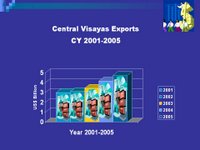I thought of sharing the speech I delivered during the commencement exercise of an IT school.
I thought you'd be interested to know the latest info on BPO and KPO.
I usually do research when I'm the one talking unlike when I'm writing for someone else (where I merely rehash motherhood statements... yeah, right ...I'm a "good" girl.. he..he..he).
Here's a trivia: did you know that there are more females (around 80%) in the BPO and KPO industries? It's a trend. Males may be good in software development, animation, computer graphics and computer aided designing but that merely represents a tiny slice of the BPO/ KPO pie. Since BPO / KPO is the future trend in business, expect to see more female breadwinners and more househusbands.
In fact, as you look around the major metro supermarkets, you can see a growing number of men pushing the baby trolley while holding the grocery basket. I'm not just talking about local men, ha... also foreign Dads (I recently saw caucasian males pushing a supermarket pushcart with toddlers on it or carrying a child while trying to figure out the grocery list. Come to think of it, men look good with babies...in fact, they look more human and domesticated that way).
Indeed, this century is the turning point in the global work culture.
____________________
The Role of the IT Enabled Industry in National Growth
A speech delivered during a Commencement Exercise
held on April 6, 2006 Cebu City
Honorable guests, graduates, ladies and gentlemen, Good Afternoon.
I truly welcome this chance to speak before you because it gives me an opportunity to present to you the promise of IT - not just IT in terms of what it could be, but IT as a reality that is increasingly becoming a part of our lives.
This reality is what will enable us to create jobs, livelihood, and opportunities to raise the incomes of a large number of our countrymen.
With the world trend towards computerization, the IT and IT enabled industries have become necessary tools for the economic development of a country.
In the Philippines, one component of the IT enabled industry that has shown great potential is Business Process Outsourcing.Business Process Outsourcing or BPO is where whole business processes are outsourced and tasks from internal production are delegated to a subcontractor.
In simple terms, this means that any work that can be done using a computer are shipped to low cost destinations such as India, Philippines and Vietnam.
Most recently, BPO has come to mean the elimination of native staff in developed countries like the United States and Britain in favor of staff overseas, where salaries are markedly lower.
Let me make it clear that the BPO phenomenon is not just a temporary situation, as what those who rally in the streets would want us to believe, but a growing trend throughout the world because of technological advancement.
The BPO industry in the Philippines is not just about call centers either. Call centers may be growing at a phenomenal rate in our country, but BPO also includes non-voice services.
At present, a lot of non-core yet critical operations from developed countries have already been outsourced to the Philippines. These are software development, accounting, architecture, engineering, healthcare, financial services, human resource administration, logistics, copyediting, indexing, web design and maintenance, data conversion, data warehousing, data capture and data entry, proofreading, encoding, graphics design and medical transcription.
There is a significant amount of labor in the Philippines that would qualify for non-voice BPO. In fact, there is a wider pool of people who would fit the profiles in the non-voice sector than in the voice component.
It is true that India is the country that proved to the world that offshore outsourcing was viable. India is also the largest and most successful offshore destination in the world. But the Philippines is a close second and is reaping BPO opportunities from India.
For the past years, India was the offshore destination of choice. Companies flocked to India to set up offices. However, India today is facing a lot of problems as a result of this mass jumping on the bandwagon. These problems are related to salary inflation, employee retention, quality of delivery, office space availability, telecommunications access and even electricity supply.
The Philippines and Vietnam are profiting from this situation since the two countries had more time to develop their industry set-ups. This is a great time to be in the Philippines for the BPO sector.
The Philippines is poised to grow the strongest of any outsourcing destination in Asia.
In Cebu, there are over 5,000 contact center seats provided by 14 call center companies. These companies, particularly the large players are continually expanding their operations in Cebu.
Other than contact centers, Cebu is also attracting non-voice work such as software development, copyediting, indexing, web design and maintenance, data conversion, data warehousing, data capture, data entry, proofreading, encoding, graphics designing, medical transcription, accounting, computer aided designing and animation.
Recent developments show that efforts of the Philippines in attracting outsourcing work has paid off. According to TheAge.Com, local outsourcing firms report revenue of about $US 4 billion, up from $US 350 million in 2001. They employ 230,000 people. India, the world's outsourcing giant, employs five times as many but has 12 times the population, which suggests the Philippines is something of a silent star on the outsourcing stage.
Today, BPO hiring growth rates in the country are between 40 to 50 percent. Hiring growth rates of call centers reach around 70 to 100 percent. Now, that is a lot of foreign investments poured into the Philippines.
Foreign investments are good for our country because it create a lot of new jobs at a fast rate. It is also the greatest driver of technological progress and benefits to consumers.
So what is our edge over our competitors?
According to most foreign business leaders, Filipinos have a customer service mindset; Filipinos, generally, speak and write better English than their Asian counterparts.
Contact centers represent 70% of the total IT and IT-enabled services workforce in the country. Thus, the need for a large pool of English-proficient professionals to fill the demand. However, the 6% annual growth rate of fresh graduates from our universities hardly makes up for the growing demand for contact center agents. One other pressing issue is the low acceptance rate in the call center industry right now. About 1 in 10 of these fresh graduates will be accepted by call centers.
The industry then sees the need to fill this gap by either tapping career shifters or improving the acceptance rates of fresh graduates and non-degree holders through trainings.
If we can get our schools to continue improving the quality of English of our graduates, we will always have something most of our competitors don't.
Obviously, the key differentiator for the Philippines remains to be the people.
India is reported to have better technical universities but the Philippines have better ones in liberal arts, which is more appropriate for back office outsourcing.
The Philippines is also said to have a better infrastructure and expatriate lifestyle. With the current trend in BPO. public and private sectors are now in a more intensive campaign to improve the English proficiency of the country's local talent pool.
There is another major reason to improve our English --- the rise of Knowledge Process Outsourcing or KPO. This involves offshoring of knowledge intensive business processes that require specialized domain in every field of expertise.
It can be said that KPO is one step ahead of BPO. KPO firms provide business expertise rather than just process expertise. Unlike BPOs, there are no night shifts, no calls from irate Americans/ Britons to deal with and no safety issues involved.
KPO firms give all the benefits of a nine-to-five job with added incentives. KPOs charge their international clients much more than BPOs. So, obviously, there is a vast difference in salaries.
In addition, not only do employees get better pay, they're also exposed to global best practices, Due to a large knowledge pool and significant cost arbitrage, few countries are front runners in providing KPO services. The nature of work also demands advanced analytical and specialized skills.
However, the success in outsourcing business process operations to India and the Philippines has encouraged many firms to start outsourcing their high-end knowledge work as well.
Recently, the Department of Trade and Industry welcomed two prospective foreign KPO investors on a lookout for an expansion site in the Philippines.
What was interesting about the meeting was that they were checking on the number of our graduates with PHD and MA degrees in Engineering and Sciences. They were very particular on the capacity of graduates to be able to comprehend volumes of highly technical data and be able to summarize it in English.
Let me emphasize here that employees of KPO firms are expected to have extensive knowledge of their field of expertise. In other words, KPO work requires higher brain power.
According to a report by GlobalSourcingNow, the Global KPO industry is expected to reach 17 billion dollars by 2010. Low-end outsourcing services have an expected Cumulative Annual Growth Rate of 26% by 2010. In contrast, the global KPO market is poised for a Cumulative Annual Growth Rate of 46%.
Some KPO services that can be outsourced to the Phiilppines are: Research & Development, Business and Technical Analysis, Learning Solutions, Animation & Design, Business & Market Research, Medical Services, Writing & Content Development, Legal Services, Intellectual Property Research, Data Analytics, Network Management, Training & Consultancy.
The Philippines faces many challenges and opportunities as world economic conditions continue to change. Stimulating demand for Philippine BPO and KPO services is a combination of many factors. It begins with the government and educational institutions working in synergy together.
With the demands imposed by the international market, there leaves no room for complacency. The world economy has now become global. This means that capital, technology and human talent go wherever returns are highest.
The challenges are there including preserving whatever economic gains the country has achieved. Our leaders still believe that the most essential factor to our country's success is human resource. These are the young minds that have been molded and developed by our educational institutions --- the same young minds that are here today.
BPO and KPO are the future of IT and IT enabled industries in the country. It is up to you to take advantage of it.
With this, I say to our graduates, let us put up our sails with the wind of confidence. And together, we will journey into a future of radiant possibilities.
Thank you and good day.
 You may have noticed that I haven’t been updating my blog as often as I should.
You may have noticed that I haven’t been updating my blog as often as I should. Exercise is an excellent antidepressant I was told and, according to experts, a great anxiety prevention..
Exercise is an excellent antidepressant I was told and, according to experts, a great anxiety prevention..
























